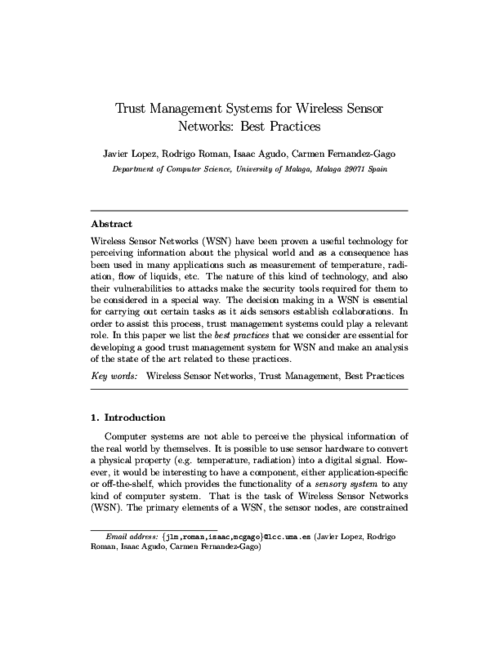 ] Year
] Year Security and Privacy in Mobile and Wireless Networking, S. Gritzalis, T. Karygiannis, and C. Skianis Eds., Troubador Publishing Ltd, pp. 105-128, 2009.
Abstract
The concept of trust has become very relevant in the late years as a consequence of the growth of fields such as internet transactions or electronic commerce. In general, trust has become of paramount importance for any kind of distributed networks, such as wireless sensor networks (WSN in the following). In this chapter of the book, we try to give a general overview of the state of the art on trust management systems for WSN and also try to identify the main features of the architectures of these trust management systems.
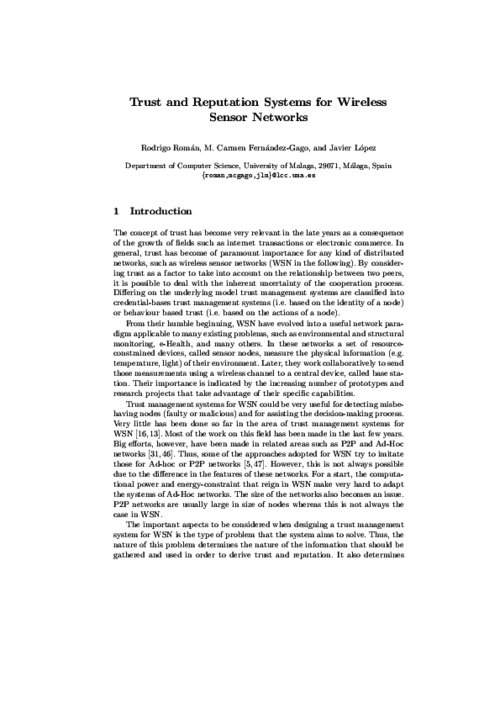
6th International Conference on Trust, Privacy and Security in Digital Business (TrustBus’09), Springer-Verlag, pp. 86-94, September, 2009. DOI
Abstract
SCADA systems represent a challenging scenario where the management of critical alarms is crucial. Their response to these alarms should be efficient and fast in order to mitigate or contain undesired effects. This work presents a mechanism, the Adaptive Assignment Manager (AAM) that will aid to react to incidences in a more efficient way by dynamically assigning alarms to the most suitable human operator. The mechanism uses various inputs for identifying the operators such as their availability, workload and reputation. In fact, we also define a reputation component that stores the reputation of the human operators and uses feedback from past experiences.
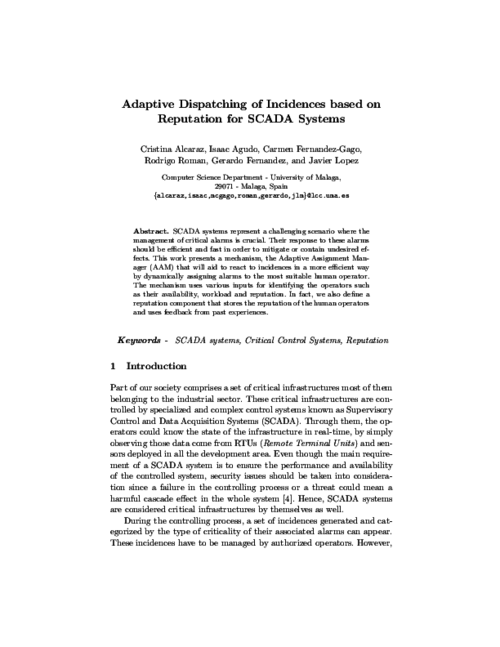
1st International Conference on Autonomic Computing and Communication Systems (Autonomics’07), ICST, October, 2007.
Abstract
Research on trust management systems for wireless sensor networks is still at a very early stage and few works have done so far. It seems that for those works which deal with the topic general features of how these systems should be are not clearly identified. In this paper we try to identify the main features that a trust management system should have and justify their importance for future developments.
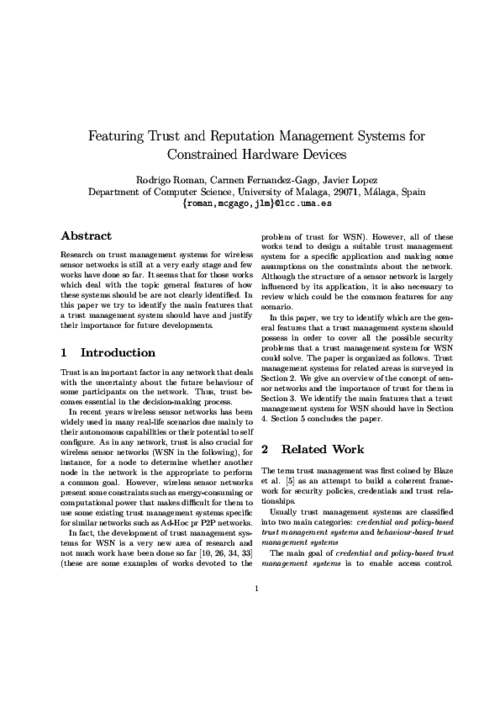
12th International Workshop on Security and Trust Management (STM), vol. LNCS 9871, Springer, pp. 98-105, 09/2016. DOI
Abstract
Software engineering and information security have traditionally followed divergent paths but lately some efforts have been made to consider security from the early phases of the Software Development Life Cycle (SDLC). This paper follows this line and concentrates on the incorporation of trust negotiations during the requirements engineering phase. More precisely, we provide an extension to the SI* modelling language, which is further formalised using answer set programming specifications to support the automatic verification of the model and the detection of privacy conflicts caused by trust negotiations.
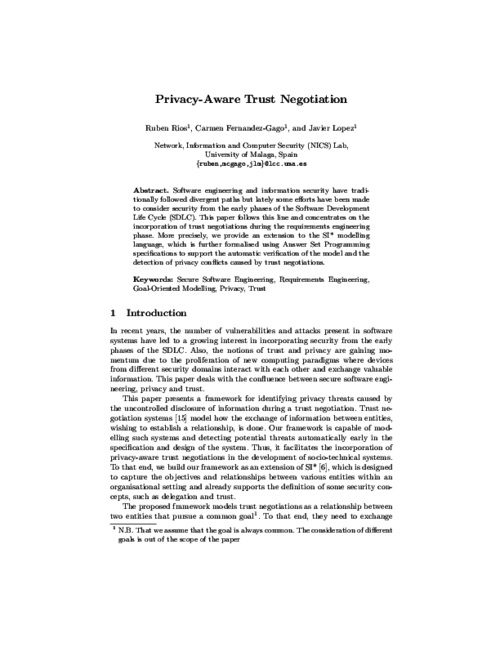
3rd International Workshop on Security, Privacy and Trust in Pervasive and Ubiquitous Computing (SecPerU’07), IEEE Computer Society, pp. 25-30, 2007. DOI
Abstract
Trust plays an important role in human life environments and virtual organizations. In the context of a network, trust may help its elements to decide whether another member of the same network is being uncooperative or malicious. Trust becomes quite important in self-configurable and autonomous systems, such as wireless sensor networks (WSN). However, very little effort has been done in the field of trust management in WSN. On the other hand, some efforts have been made in quite related fields such as Ad-hoc and P2P networks. In this paper we give an overview of existing trust management solutions, mainly those developed for Ad-Hoc and P2P networks and, more importantly, investigate their suitability to WSN. We also provide some guidelines to aid the development of trust management systems for WSN according to the nature of these networks.
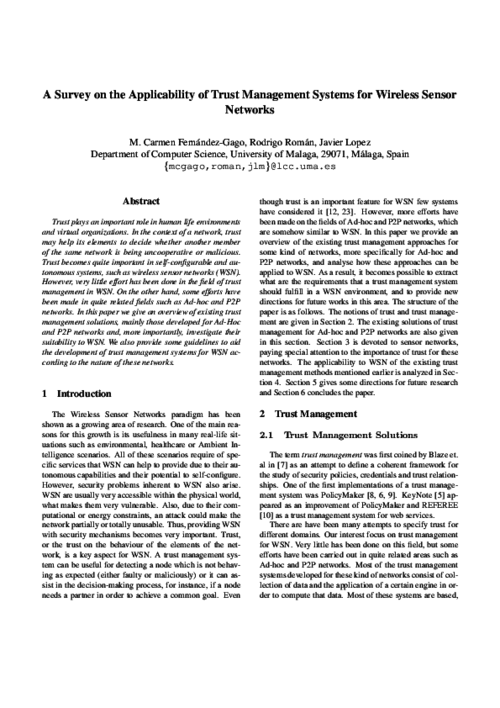
26th International Conference on Advanced Information Systems Engineering (CAiSE 2014), M. Jarke, et al. Eds., LCNS 8484, Springer, pp. 136-149, 06/2014. DOI
Abstract
Cloud sourcing consists of outsourcing data, services and infrastructure to cloud providers. Even when this outsourcing model brings advantages to cloud customers, new threats also arise as sensitive data and critical IT services are beyond customers' control. When an organization considers moving to the cloud, IT decision makers must select a cloud provider and must decide which parts of the organization will be outsourced and to which extent. This paper proposes a methodology that allows decision makers to evaluate their trust in cloud providers. The methodology provides a systematic way to elicit knowledge about cloud providers, quantify their trust factors and aggregate them into trust values that can assist the decision-making process. The trust model that we propose is based on trust intervals, which allow capturing uncertainty during the evaluation, and we define an operator for aggregating these trust intervals. The methodology is applied to an eHealth scenario.
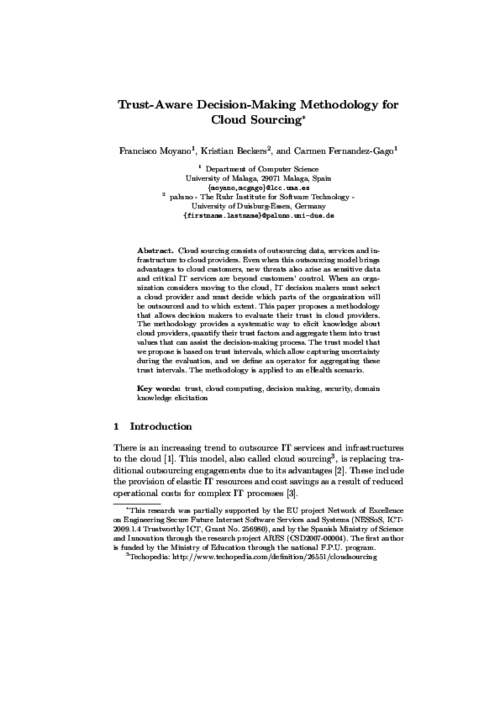
Computers & Security, vol. 77 , issue August 2018, Elsevier, pp. 773-789, 2018. DOI
Abstract
Trust negotiations are mechanisms that enable interaction between previously unknown users. After exchanging various pieces of potentially sensitive information, the participants of a negotiation can decide whether or not to trust one another. Therefore, trust negotiations bring about threats to personal privacy if not carefully considered. This paper presents a framework for representing trust negotiations in the early phases of the Software Development Life Cycle (SDLC). The framework can help software engineers to determine the most suitable policies for the system by detecting conflicts between privacy and trust requirements. More precisely, we extend the SI* modelling language and provide a set of predicates for defining trust and privacy policies and a set of rules for describing the dynamics of the system based on the established policies. The formal representation of the model facilitates its automatic verification. The framework has been validated in a distributed social network scenario for connecting drivers with potential passengers willing to share a journey.
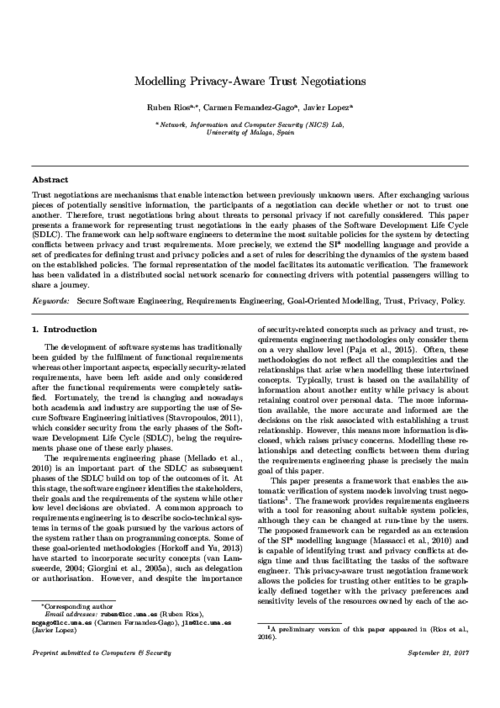
Computer Communications, vol. 33, no. 9, Elsevier, pp. 0140-3664, 2010. DOI
Abstract
Wireless sensor networks (WSNs) have been proven a useful technology for perceiving information about the physical world and as a consequence has been used in many applications such as measurement of temperature, radiation, flow of liquids, etc. The nature of this kind of technology, and also their vulnerabilities to attacks make the security tools required for them to be considered in a special way. The decision making in a WSN is essential for carrying out certain tasks as it aids sensors establish collaborations. In order to assist this process, trust management systems could play a relevant role. In this paper, we list the best practices that we consider are essential for developing a good trust management system for WSN and make an analysis of the state of the art related to these practices.
